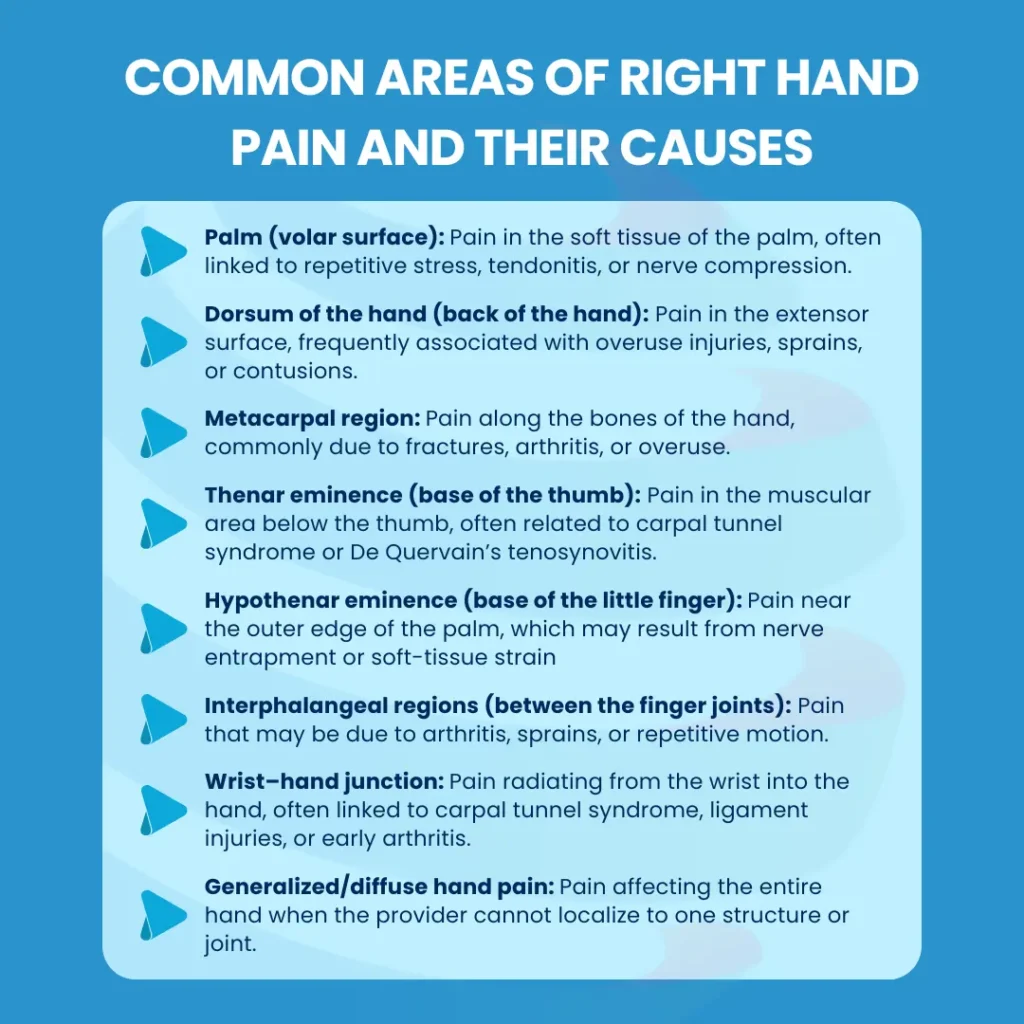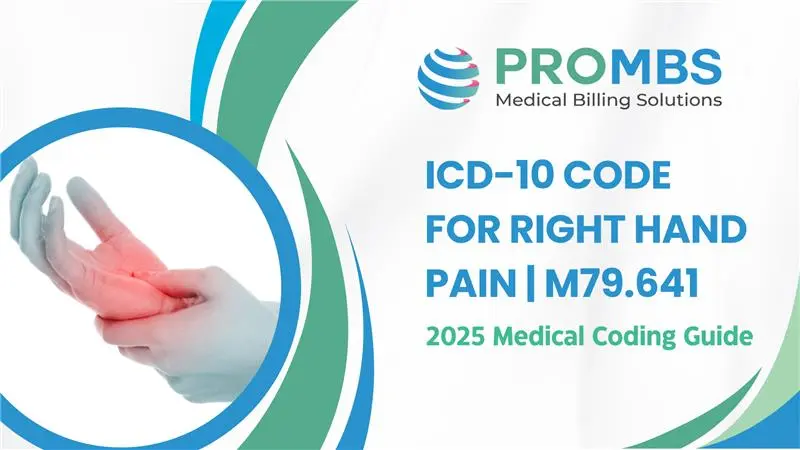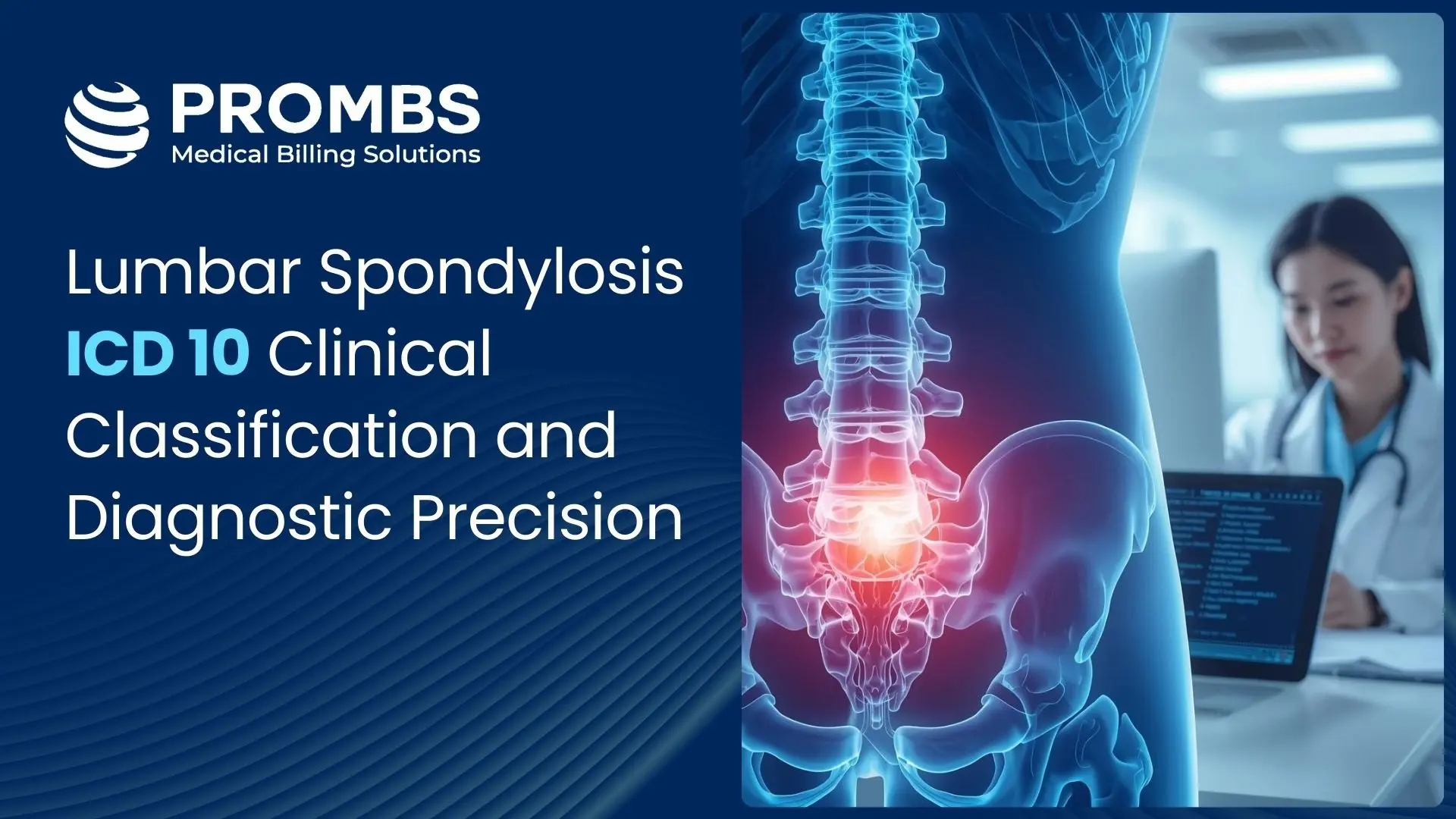Accurate medical coding is critical for clean claim submission and reimbursement. When a patient presents with right hand pain, coders must select the most specific ICD-10 code supported by clinical documentation. In 2025, the correct ICD-10-CM code is M79.641 – Pain in right hand.
This blog will help you understand the ICD-10 code for right hand pain, its clinical context, related codes, and how to prevent claim denials by meeting documentation requirements. Whether you are a provider, coder, or medical billing specialist, mastering this code is essential for compliance and revenue integrity.
What Is Right Hand Pain?
Right hand pain is a clinical symptom, not a standalone diagnosis, and it may arise from a wide range of underlying conditions. Common causes include musculoskeletal strain or repetitive overuse, arthritis and degenerative joint disease, nerve compression such as carpal tunnel syndrome, traumatic injuries like fractures, dislocations, or sprains, and tendonitis or soft tissue inflammation. Because of its non-specific nature, ICD-10 coding requires precise provider documentation that identifies the exact cause, laterality, and anatomical location of the pain to ensure accurate claim submission.
Symptoms of right-hand pain often vary depending on the underlying condition. Patients may present with:
- Localized pain in the palm, dorsum, or wrist region
- Swelling, redness, or stiffness around the joints
- Limited or decreased range of motion
- Numbness, tingling, or weakness when nerves are involved
- Difficulty with grasping, writing, or performing fine motor tasks
For coders, it is critical to verify whether the pain is acute, chronic, or unspecified, and whether laterality is clearly documented. This distinction impacts the correct ICD-10 selection using M79.641 for right hand pain versus M79.649 for unspecified cases.

What Is the ICD-10 Code for Right Hand Pain?
The correct ICD-10-CM code for right hand pain is M79.641 (Pain in right hand). It falls under the category M79.64 (Pain in hand and fingers), which is used when the provider documents pain localized to the right hand without identifying a more specific underlying pathology. This code is billable and specific, meaning it can be used for reimbursement in professional claims.
Right hand pain is coded as a symptom when no definitive diagnosis (such as fracture, arthritis, or tendonitis) has been established. If a more specific condition is documented, coders should code that condition instead of the symptom.
Acute vs. Chronic Pain Considerations
When documenting hand pain, coders must also distinguish between acute and chronic pain if the provider specifies duration. ICD-10-CM requires the use of the G89 series for chronic pain. For example, if the provider documents “chronic right-hand pain,” you may need to assign G89.29 (Other chronic pain) as the primary diagnosis and use M79.641 (Pain in right hand) as an additional code to indicate location. Clear provider documentation of duration and clinical context is essential to select the correct combination of codes and avoid denials.
Quick Reference Table: ICD-10 Codes for Hand and Finger Pain
| ICD-10 Code | Description | When to Use |
|---|---|---|
| M79.641 | Pain in right hand | General/soft-tissue pain in the right hand, no specific cause identified |
| M79.642 | Pain in left hand | General/soft-tissue pain in the left hand |
| M79.643 | Pain in unspecified hand | When documentation does not specify right or left |
| M79.644 | Pain in right finger(s) | Pain isolated to one or more right fingers |
| M79.645 | Pain in left finger(s) | Pain isolated to one or more left fingers |
| M79.646 | Pain in unspecified finger(s) | Finger pain, laterality not documented |
| M25.541 | Pain in joints of right hand | Pain specifically localized to a joint in the right hand |
| M25.542 | Pain in joints of left hand | Pain specifically localized to a joint in the left hand |
| M25.549 | Pain in joints of unspecified hand | Joint pain, laterality not documented |
When to Use ICD-10 Code for Right Hand Pain (M79.641)
- Pain documented in the right hand only, not isolated to a specific joint or finger.
- No definitive diagnosis has been established (symptom-based coding).
- Pain is the primary reason for the encounter (e.g., patient presents with hand pain, evaluation pending).
When Not to Use M79.641
- If the pain is joint-specific → use M25.541.
- If the pain is finger-specific → use M79.644–M79.646.
- If the provider has diagnosed a definitive condition (fracture, arthritis, nerve compression, etc.), code the condition instead of the symptom.
- If laterality is not documented → use M79.643 until clarified.
What CPT Codes Are Commonly Billed with Right Hand Pain?
When coding ICD-10 Code for Right Hand Pain (M79.641), providers often bill supporting CPT or HCPCS codes that reflect the evaluation, imaging, or treatment performed during the encounter. These codes help demonstrate medical necessity and ensure proper reimbursement. The table below summarizes some of the most commonly paired CPT/HCPCS codes with this diagnosis.
Quick Reference Table: CPT/HCPCS Codes for Right Hand Pain
| CPT/HCPCS Code | Description | Common Use with M79.641 |
|---|---|---|
| 99213–99215 | Office or outpatient E/M services | Evaluation and management of established patients presenting with hand pain |
| 73130 | X-ray, hand; complete, minimum 3 views | Diagnostic imaging to rule out fracture or structural abnormality |
| 97110 | Therapeutic exercises | Physical therapy for strengthening, mobility, or functional recovery |
| 20550 | Injection(s); tendon sheath, ligament, trigger finger | Used for tendonitis or localized soft-tissue conditions. Should only be linked to M79.641 if pain documentation supports soft-tissue/tendon involvement and no definitive pathology has been established. |
| J3490 / J3301 | Drug codes for corticosteroid injections | Supplies billed for injection procedures (e.g., Kenalog). Use cautiously with M79.641—documentation must show pain is related to tendon/soft-tissue involvement without a confirmed diagnosis. |
Why Do Claims for Right Hand Pain (M79.641) Get Denied?
Even when the ICD-10 Code for Right Hand Pain (M79.641) is accurate, claims may still be denied for a variety of reasons. Below are the most frequent causes of denials and how they typically occur in billing workflows.
Lack of Specificity in Diagnosis
Payers often deny claims when documentation is vague, such as noting only “hand pain” without identifying laterality. Coders must ensure the provider clearly states “right hand pain” so the claim matches the code submitted. Using unspecified codes when laterality is known increases the risk of rejection.
Incorrect Linkage Between CPT and ICD-10
Another frequent cause of denial is mismatched linkage between procedure codes and diagnoses. If an X-ray, therapy, or injection is billed but not tied to M79.641 in Box 24E, the payer may determine that the service was not medically necessary. Correct diagnosis-to-procedure mapping is critical for payment.
What Should You Put in Box 24E on the CMS-1500 Claim Form?
Many billers are confused about whether to enter numbers or letters in Box 24E. The official NUCC and CMS-1500 instructions state that you must use the letters (A–L) that correspond to the diagnosis codes entered in Box 21. Each diagnosis code listed in Box 21 is automatically assigned a letter in sequence “A” for the first code, “B” for the second, and so on, up to “L” for the twelfth code.
In older versions of the form, some payers accepted numbers (1–4), but this has been updated, the current standard requires letters. If a claim has more than four diagnoses, you can still point to diagnosis codes E through L, as the CMS-1500 allows up to 12 total. The key is making sure the pointer in Box 24E matches exactly with the letter assigned to the correct diagnosis in Box 21. For example, if M79.641 is listed as diagnosis “A,” and you bill CPT 73130 for an X-ray of the hand, Box 24E should have “A.” If both M79.641 (A) and another supporting code (B) justify the service, you may enter multiple letters separated by commas.
Overuse of Unspecified Codes
Missing Evidence of Medical Necessity
Even with the correct code, claims may be denied if documentation does not establish medical necessity. Provider notes should include symptoms, examination findings, or diagnostic testing that support the need for evaluation or treatment. Without this level of detail, payers may classify the service as not justified.
Payer Coverage Policies (LCDs/NCDs)
Medical necessity is not only determined by provider notes but also by payer coverage rules. Medicare and many commercial carriers follow Local Coverage Determinations (LCDs) and National Coverage Determinations (NCDs) that outline when certain treatments are covered. For example, physical therapy, imaging, or injections may not be reimbursed if hand pain is reported without an identifiable underlying pathology. Coders and billers should always review the relevant LCD/NCD policies for their region and ensure that documentation supports both the diagnosis and the medical necessity of the ordered service.
Improper POS Codes or Modifiers
Finally, errors in Place of Service (POS) coding or missing modifiers often cause denials, especially with therapy and telehealth. Medicare requires POS 02 or POS 10 for telehealth visits, while some commercial insurers still accept POS 11 if paired with modifier 95. Using the wrong code or forgetting the modifier leads to unnecessary rejections.
Documentation Requirements for M79.641
How Pro-MBS Helps Ensure Accurate Coding for Right Hand Pain
Our certified medical coders and billers apply strict compliance protocols to ensure that ICD-10 Code for Right Hand Pain (M79.641) used with maximum accuracy. We go beyond assigning diagnosis codes by validating that provider documentation specifies laterality, severity, onset, and associated findings. Our team cross-checks ICD-10 selections with CPT/HCPCS procedures, making sure that each service line is correctly linked in Box 24E and fully supported by clinical documentation. This reduces denials tied to vague coding, unspecified laterality, or mismatched diagnosis-to-procedure mapping.
In addition, Pro-MBS integrates payer-specific policies into our coding workflows. We monitor updates to Medicare, Medicaid, and commercial carrier rules for POS coding, telehealth modifiers, and medical necessity requirements. Our compliance audits and pre-submission claim reviews help providers maintain clean claim rates, avoid revenue leakage, and strengthen audit readiness. By combining technical coding expertise with payer-driven validation, Pro-MBS ensures that claims for conditions such as right-hand pain are both accurately coded and reimbursement-ready.



